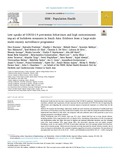| dc.contributor.author | Kusuma, Dian | |
| dc.contributor.author | Pradeepa, Rajendra | |
| dc.contributor.author | Khawaja, Khadija I. | |
| dc.contributor.author | Hasan, Mehedi | |
| dc.contributor.author | Siddiqui, Samreen | |
| dc.contributor.author | Mahmood, Sara | |
| dc.contributor.author | Shah, Syed Mohsin Ali | |
| dc.contributor.author | De Silva, Chamini K. | |
| dc.contributor.author | de Silva, Laksara | |
| dc.contributor.author | Gamage, Manoja | |
| dc.contributor.author | Loomba, Menka | |
| dc.contributor.author | Rajakaruna, Vindya P. | |
| dc.contributor.author | Hanif, Abu AM | |
| dc.contributor.author | Kamalesh, Rajan Babu | |
| dc.contributor.author | Kumarendran, Balachandran | |
| dc.contributor.author | Loh, Marie | |
| dc.contributor.author | Misra, Archa | |
| dc.contributor.author | Tassawar, Asma | |
| dc.contributor.author | Tyagi, Akansha | |
| dc.contributor.author | Waghdhare, Swati | |
| dc.contributor.author | Burney, Saira | |
| dc.contributor.author | Ahmad, Sajjad | |
| dc.contributor.author | Mohan, Viswanathan | |
| dc.contributor.author | Sarker, Malabika | |
| dc.contributor.author | Goon, Ian Y. | |
| dc.contributor.author | Kasturiratne, Anuradhani | |
| dc.contributor.author | Kooner, Jaspal S. | |
| dc.contributor.author | Katulanda, Prasad | |
| dc.contributor.author | Jha, Sujeet | |
| dc.contributor.author | Anjana, Ranjit Mohan | |
| dc.contributor.author | Mridha, Malay K. | |
| dc.contributor.author | Sassi, Franco | |
| dc.contributor.author | Chambers, John C. | |
| dc.date.accessioned | 2022-06-20T04:22:13Z | |
| dc.date.available | 2022-06-20T04:22:13Z | |
| dc.date.copyright | 2021 | |
| dc.date.issued | 2021-02-13 | |
| dc.identifier.citation | Kusuma, D., Pradeepa, R., Khawaja, K. I., Hasan, M., Siddiqui, S., Mahmood, S., . . . NIHR Global Health Research Unit for Diabetes and Cardiovascular Disease in South Asia. (2021). Low uptake of COVID-19 prevention behaviours and high socioeconomic impact of lockdown measures in south asia: Evidence from a large-scale multi-country surveillance programme. SSM - Population Health, 13 doi:10.1016/j.ssmph.2021.100751 | en_US |
| dc.identifier.uri | http://hdl.handle.net/10361/17001 | |
| dc.description | This article was published in the SSM - Population Health by Elsevier [© 2021 Published by Elsevier Inc.] and the definite version is available at: https://doi.org/10.1016/j.ssmph.2021.100751 The Journal's website is at: https://www.sciencedirect.com/science/article/pii/S2352827321000264?via%3Dihub | en_US |
| dc.description.abstract | Background: South Asia has become a major epicentre of the COVID-19 pandemic. Understanding South Asians’
awareness, attitudes and experiences of early measures for the prevention of COVID-19 is key to improving the
effectiveness and mitigating the social and economic impacts of pandemic responses at a critical time for the
Region.
Methods: We assessed the knowledge, behaviours, health and socio-economic circumstances of 29,809 adult men
and women, at 93 locations across four South Asian countries. Data were collected during the national lockdowns
implemented from March to July 2020, and compared with data collected prior to the pandemic as part of an
ongoing prospective surveillance initiative.
Results: Participants were 61% female, mean age 45.1 years. Almost half had one or more chronic disease,
including diabetes (16%), hypertension (23%) or obesity (16%). Knowledge of the primary COVID-19 symptoms
and transmission routes was high, but access to hygiene and personal protection resources was low (running
water 63%, hand sanitisers 53%, paper tissues 48%). Key preventive measures were not widely adopted.
Knowledge, access to, and uptake of COVID-19 prevention measures were low amongst people from disadvantaged socio-economic groups. Fifteen percent of people receiving treatment for chronic diseases reported loss of
access to long-term medications; 40% reported symptoms suggestive of anxiety or depression. The prevalence of
unemployment rose from 9.3% to 39.4% (P < 0.001), and household income fell by 52% (P < 0.001) during the lockdown. Younger people and those from less affluent socio-economic groups were most severely impacted.
Sedentary time increased by 32% and inadequate fruit and vegetable intake increased by 10% (P < 0.001 for
both), while tobacco and alcohol consumption dropped by 41% and 80%, respectively (P < 0.001), during the
lockdown.
Conclusions: Our results identified important knowledge, access and uptake barriers to the prevention of COVID19 in South Asia, and demonstrated major adverse impacts of the pandemic on chronic disease treatment, mental
health, health-related behaviours, employment and household finances. We found important sociodemographic
differences for impact, suggesting a widening of existing inequalities. Our findings underscore the need for
immediate large-scale action to close gaps in knowledge and access to essential resources for prevention, along
with measures to safeguard economic production and mitigate socio-economic impacts on the young and the
poor. | en_US |
| dc.language.iso | en_US | en_US |
| dc.publisher | Elsevier | en_US |
| dc.relation.uri | https://www.sciencedirect.com/science/article/pii/S2352827321000264?via%3Dihub | |
| dc.subject | COVID-19 | en_US |
| dc.subject | Preventative measures | en_US |
| dc.subject | Socioeconomic impact | en_US |
| dc.subject | South Asia | en_US |
| dc.subject | Surveillance system | en_US |
| dc.title | Low uptake of COVID-19 prevention behaviours and high socioeconomic impact of lockdown measures in South Asia: Evidence from a large-scale multi-country surveillance programme | en_US |
| dc.type | Thesis | en_US |
| dc.description.version | Published | |
| dc.contributor.department | Brac James P. Grant School of Public Health | |
| dc.identifier.doi | https://doi.org/10.1016/j.ssmph.2021.100751 | |
| dc.relation.journal | SSM - Population Health | |

